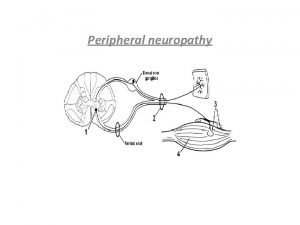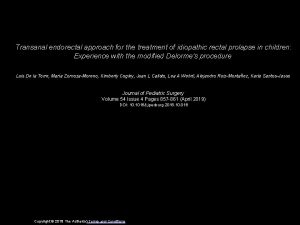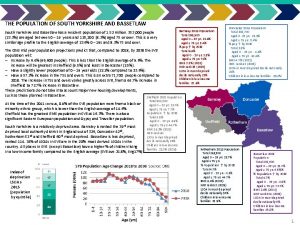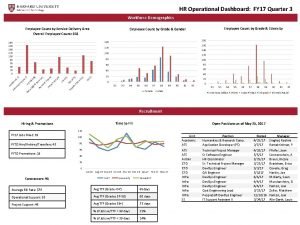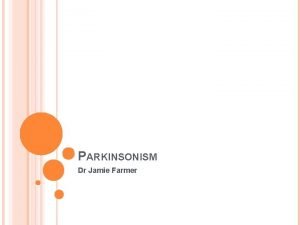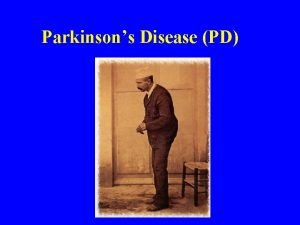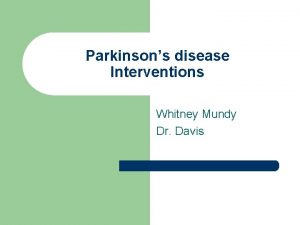Differing Demographics of Vascular Parkinsonism and Idiopathic Parkinsons



























- Slides: 27

Differing Demographics of Vascular Parkinsonism and Idiopathic Parkinson’s Disease Karthik Sarma MD Resident PGY 4 Shreyansh Shah MD and William Ondo MD Dept of Neurology 14 th April, 2011 63 rd AAN Annual Meeting, Hawaii, 2011.

Disclosures • Anand K Sarma, MD • Shreyansh D Shah, MD No disclosures • William G Ondo, MD W. Ondo: Grant Support: Ipsen, Acadia, Bayer, Takeda, Allergan, PSG, HSG, IMPAX Speaking / Consulting fees: GSK, Allergan, Novartis, Ipsen, TEVA, UCB Pharma, Merz, Lundbeck No disclosures

Vascular Parkinsonism • Critchley introduced the term in 1929 • Initially used to describe clinical presentations consisting of… ü rigidity ü short-stepping gait ü fixed facies ü pyramidal, pseudobulbar signs and cerebellar signs ü dementia and urinary incontinence • Variously referred to as Lower Body Parkinsonism, Arteriosclerotic Pseudo. Parkinsonism, etc.

Features of VP • Clinical § § Typically older age of onset Shorter duration of symptoms at presentation Symmetric gait difficulties No rest tremor • Imaging § Typically chronic small vessel ischemic changes • Pathology § Absence of Lewy body pathology

Imaging Source: BCM imaging database

Diagnosing VP • No consensus diagnostic criteria available • Diagnostic problem in the community especially when non-neurologists and non-movement disorders experts involved in making the diagnosis of Parkinsonian symptoms • Several criteria proposed including: ü Vascular Rating Scale by Winikates and Jankovic ü Loeb and Gandolfo’s modification of Hachinski score ü Zijlmans et al criteria for VP

Epidemiology of idiopathic PD • Age of the patient considered as one of the most important risk factors for development of PD AGE α RISK of PD • Studies have revealed that both Incidence and Prevalence increase with age

Prevalence studies

Incidence of PD Age- and sex-specific average annual incidence rates (per 100, 000 person-years) of parkinsonism and its types: Olmsted County, MN, 1976– 1990* Incidence and distribution of parkinsonism in Olmsted County, Minnesota, 1976 -1990. Bower JH, Maraganore DM, Mc. Donnell SK, Rocca WA. Neurology. 1999 Apr 12; 52(6): 1214 -20.

Question… Does the misdiagnosis of VP as PD increase the age of onset of PD in epidemiologic studies?

Hypothesis VP misdiagnosed as PD would cause the average at symptom onset of PD to increase, altering the age related distribution of PD and hence the epidemiology of PD. The incidence of PD in the population follows a bell shaped (normal) distribution about a median age of 60 years.

Study Methods • Queried the PDCMDC database for the last 100 consecutive active patients with a diagnosis of VP and PD each. • Collected demographic information including age at symptom onset, risk factors, clinical and radiological features. • Examined entire database for diagnoses ratio. • Calculated how VP would alter epidemiology of PD if labeled as PD.

Results Diagnosis No. of Patients Mean Age at Sx Onset VP without overt stroke 81 74. 07 VP with overt stroke 17 71. 29 All VP 98 (31 F) 73. 59 PD 102 (37 F) 57. 81 ü No. of VP charts examined: 108 ü Diagnosis changed after initial assignment: 10 ü Total No. of VP considered for analysis: 98 ü The difference of the mean age at symptom onset between VP with and without overt stroke was not significantly different, p = 0. 34

Results continued VP PD p value * Mean age in years at presentation (SD) 77. 12 (6. 58) 63. 4 (12. 22) <0. 0001 Mean age in years at symptom onset (SD) 73. 1 (7. 62) 57. 8 (11. 22) <0. 0001 *- using Mann Whitney U test

Early Clinical Features: Comparison Prominent Symptom VP (%) PD (%) p value* Bradykinesia 16 24 0. 22 Tremor 13 70 <0. 0001 Gait 87 13 <0. 0001 RBD 3 0 0. 116 UE symptoms 3 0 0. 116 * Chi Square test

Prominent Clinical Features at Presentation % Patients Clinical features

Risk Factors: Comparison Risk Factor VP (%) PD (%) p value* HTN 59 41 0. 016 Smoking 35 23 0. 044 HLD 32 27 0. 356 CAD 29 15 0. 016 DM 23 16 0. 212 Afib 10 2 0. 017 TIA 9 4 0. 158 Stroke 17 1 <0. 0001 PVD 1 1 1 Carotid Dz 1 2 1 No known risk 16 35 0. 006 * Chi Square test

Risk Factors: Comparison Risk Factor VP (%) PD (%) p value* HTN 59 41 0. 016 Smoking 35 23 0. 044 HLD 32 27 0. 356 CAD 29 15 0. 016 DM 23 16 0. 212 Afib 10 2 0. 017 TIA 9 4 0. 158 Stroke 17 1 <0. 0001 PVD 1 1 1 Carotid Dz 1 2 1 No known risk 16 35 0. 006 * Chi Square test

Risk Factors % Patients Vascular Risk Factors

Imaging Characteristics % Patients

Age wise distribution of Onset of Symptoms % Patients Age Groups in years

Caveats of extrapolating the results to predict age of onset for “PD”… • Sample of 200 patients may not be a representative sample of the database • Patient sample and database may not be representative of the population • Obvious recruitment bias at a Parkinson’s Disease center • Relative occurrence of VP and PD in the population are not similar to database

But if we did extrapolate… VP PD Total Study Patient Nos. 98 102 200 Mean age at onset of symptoms in Study 73. 59 57. 81 Database Patient Nos. 805 6937 Does VP misdiagnosed as PD increase the average at onset of PD? 7742

Mean Age at Onset for PD would increase from: 57. 81 to 59. 36 [ 73. 59 * 805 / 7742 ] + [ 57. 81 * 6937 / 7742 ] = 59. 36 Proportional weighting based on relative occurrence

Value of study • Provides a possible explanation for variability in epidemiology trials of age of onset for PD and more commonly, falsely elevated ages • Encouraged future studies such as the ongoing sorting of our entire database • Demands a population based incidence study differentiating VP and PD • Importance of differentiating the two in the community given disparate pathophysiology, progression, response to treatment, prognosis and importantly, person making the diagnosis.

Acknowledgements I would like to thank my friend and colleague, Yogeshwar V Kalkonde for his valuable input and help.

Questions? View of Waikiki sunset from my room. Karthik Sarma; 9 th April, 2011. Thank you!
 Entacapone
Entacapone Vascular and non vascular difference
Vascular and non vascular difference Vascular vs nonvascular plants
Vascular vs nonvascular plants Anthiridium
Anthiridium Mononeuritis multiplex
Mononeuritis multiplex Idiopathic hirsutism
Idiopathic hirsutism Idiopathic oat
Idiopathic oat Idiopathic hirsutism
Idiopathic hirsutism Serpentine stare parkinson's
Serpentine stare parkinson's Basal ganglia
Basal ganglia Parkinsons disease
Parkinsons disease Is parkinsons hereditery
Is parkinsons hereditery Amantadin
Amantadin Behcets disease wiki
Behcets disease wiki What is intrapersonal barrier
What is intrapersonal barrier Demographics and the demand for higher education
Demographics and the demand for higher education Forever 21 britney
Forever 21 britney Walmart shopper profile
Walmart shopper profile Uf demographics
Uf demographics Population of yorkshire
Population of yorkshire Sfa demographics
Sfa demographics Causes of homelessness orange county
Causes of homelessness orange county Harvard demographics
Harvard demographics Sfa demographics
Sfa demographics Demographic cohort
Demographic cohort Nfl marketing strategy
Nfl marketing strategy Hr operations dashboard
Hr operations dashboard Himachal pradesh map
Himachal pradesh map




